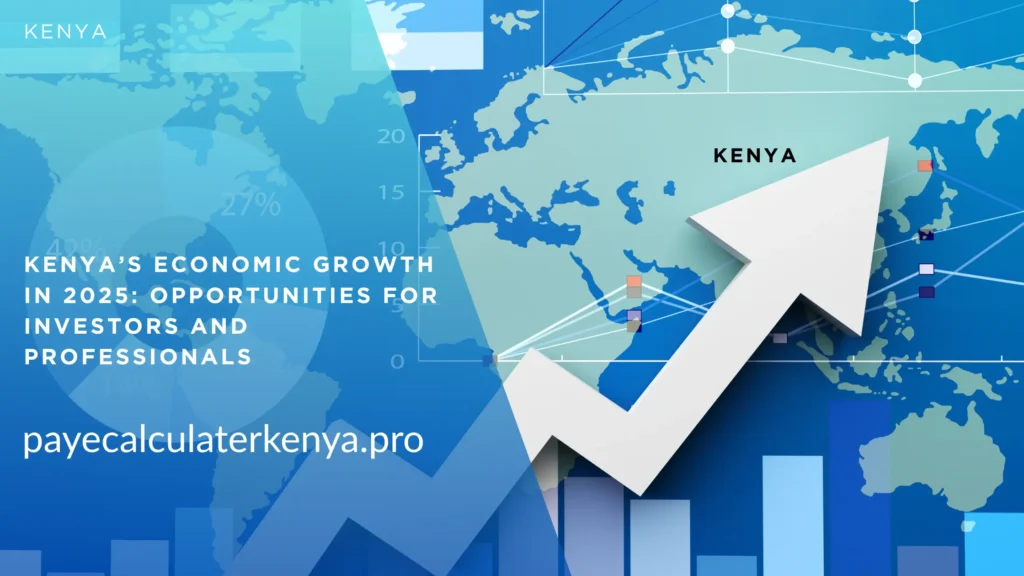Kenya Economic Growth in 2025: Opportunities for Investors and Professionals
Kenya’s economy is set to grow 5.3% in 2025, outpacing many African nations. Agriculture, services, and technology drive this growth, creating opportunities for investors, entrepreneurs, and professionals. The Finance Act 2025 and stable policies boost confidence, despite risks like climate shocks and global financing issues. This guide explores growth sectors, investment opportunities, career paths, and actionable steps, using data from the African Development Bank and other trusted sources.

Why Kenya’s Economy Is Growing
Kenya’s GDP grew 5.2% in 2023 and is projected to hit 5.3% in 2025. Agriculture contributes 23% to growth, recovering from droughts. Services, like tourism and telecom, add 69%, fueled by household spending (70% of demand). Inflation will drop to 5.5% in 2025 from 7.7% in 2023. The Central Bank’s rate cuts to 9.75% spur credit growth. Government reforms, like the Finance Act 2025, ease business costs. Risks include global trade slowdowns and climate challenges.
Top Investment Opportunities
Kenya’s growth creates profitable sectors for investors:
- Agribusiness: Agriculture drives 23% of GDP growth. Invest in agro-processing, like coffee or tea exports. Government supports SMEs with loans.
- Example: A KES 10 million maize processing plant could yield 20% returns.
- Fintech: Kenya leads Africa in startups, with M-Pesa dominating mobile money. Invest in digital payment or lending platforms.
- Example: A fintech startup could tap Kenya’s 70% mobile money penetration.
- Infrastructure: $600 million in road projects and public-private partnerships offer opportunities. Tax breaks support renewable energy like geothermal.
- Example: A $5 million solar project could benefit from concessional funding.
- Renewable Energy: Over 90% of electricity comes from renewables. Invest in geothermal or solar, backed by fiscal incentives.
- Example: A 35MW geothermal project could secure MIGA funding.
- Healthcare: The Social Health Insurance Act boosts hospital investments. Telemedicine and private clinics are growing fast.
- Example: A KES 50 million clinic could serve Kenya’s growing population.
| Sector | Why Invest | Potential Return |
|---|---|---|
| Agribusiness | 23% GDP contribution | 15–20% |
| Fintech | High mobile penetration | 20–30% |
| Infrastructure | Government funding | 10–15% |
| Renewable Energy | Tax incentives | 12–18% |
| Healthcare | New health policies | 15–25% |
Career Prospects in 2025
Economic growth fuels job demand in these fields:
- Financial Analyst: Analyzes investments in fintech or infrastructure. Needs data skills and CFA certification.
- Salary: KES 1,200,000–3,000,000 yearly.
- Tech Developer: Builds apps for fintech or healthcare. Requires coding and digital finance knowledge.
- Salary: KES 1,000,000–2,400,000 yearly.
- Agricultural Specialist: Manages agro-processing projects. Needs agronomy and business skills.
- Salary: KES 800,000–2,000,000 yearly.
- Renewable Energy Engineer: Designs solar or geothermal systems. Requires engineering and project management skills.
- Salary: KES 1,500,000–3,600,000 yearly.
- Healthcare Administrator: Runs clinics under new health laws. Needs management and policy knowledge.
- Salary: KES 1,000,000–2,500,000 yearly.
How Tax Changes Help
The Finance Act 2025 supports growth:
- SEP Tax: Encourages fintech by taxing digital platforms, creating tech jobs.
- VAT Exemptions: Lowers costs for agricultural inputs, boosting agribusiness jobs.
- APAs: Attracts multinationals, increasing demand for financial analysts.
- Tax Incentives: Supports renewable energy, creating engineering roles.
How to Seize Opportunities
- Investors:
- Research agribusiness or fintech startups on platforms like MyJobMag.
- Explore government incentives via the KRA website (www.kra.go.ke).
- Partner with local firms for infrastructure projects.
- Professionals:
- Learn coding, data analysis, or tax law at schools like Strathmore University.
- Get certifications like CFA or CPA for finance roles.
- Network at Nairobi tech hubs like iHub.
- Entrepreneurs:
- Start agro-processing or fintech ventures with government loans.
- Attend investment forums like the AfDB Annual Meetings.
Conclusion
Kenya’s 5.3% growth in 2025 offers investors and professionals exciting prospects. Agribusiness, fintech, infrastructure, and renewable energy lead investment opportunities. Finance, tech, and energy jobs are in demand, driven by tax reforms. Despite risks like climate shocks, Kenya’s stable policies make it a top African hub. Act now invest, upskill, or start a business to ride this growth wave.
